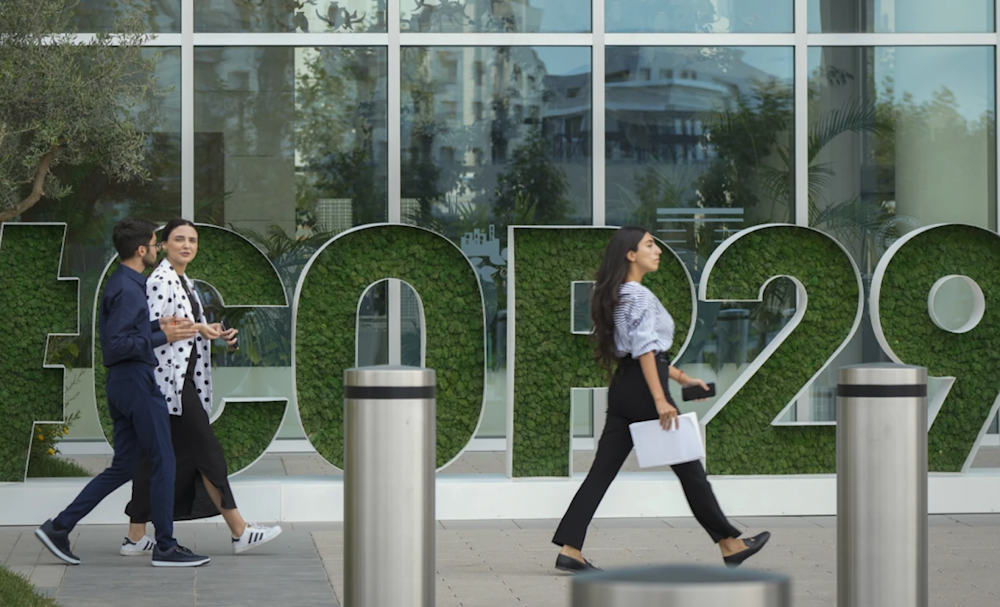UN Climate Change Conference set to start in Azerbaijan
A UN statement stressed that finance is a key focus of the conference, as "trillions of dollars" are needed to reduce greenhouse gas emissions and protect the world from the impacts of climate change.
-

People walk by a sign for COP29, the UN Climate Change Conference in Baku, Azerbaijan, on September 17, 2024. (AP)
The 29th Conference of the Parties to the UN Framework Convention on Climate Change (COP29) will begin on Monday in the Azerbaijani capital Baku, with the goal of addressing growing climate issues.
Leaders from around the world are expected to convene in Baku for the event, which runs until November 22.
According to a UN statement, with global temperature highs and extreme weather affecting the globe, "COP29 will bring together leaders from governments, business, and civil society to advance concrete solutions to the defining issue of our time."
Finance is a key focus of the conference, as " trillions of dollars are required for countries to drastically reduce greenhouse gas emissions and protect lives and livelihoods from the worsening impacts of climate change," the statement added.
The United Nations Framework Convention on Climate Change (UNFCCC) is a multilateral treaty that was developed in 1992 in response to the IPCC's first assessment report.
Its primary goal is to stabilize greenhouse gas concentrations in order to prevent hazardous human-caused interference with the climate system.
Since its inception in 1994, the UNFCCC has served as the platform for global climate discussions, resulting in major accords such as the Kyoto Protocol in 1997 and the Paris Agreement in 2015. All 198 Parties convene annually to review progress and develop solutions to the global challenge.
People 'paying terrible price' for climate inaction: Guterres
UN Secretary-General Antonio Guterres once again raised the alarm about global warming, saying that humanity is already "paying a terrible price" for failing to act on the matter.
The UN Environment Programme (UNEP) issued a new study last month citing all-time high greenhouse gas emissions documented in the UN Emissions Gap study 2024, asking world leaders to take immediate action to avert catastrophic rises in temperatures and avoid the worst impacts of climate change.
Guterres stated in a recorded statement during the publication of the UNEP's Emissions Gap report that the emissions gap is not an abstract concept, emphasizing that "there is a direct link between increasing emissions and increasingly frequent and intense climate disasters," asserting that the report clearly showed "there can be no more playing for time. We are out of time."
"Around the world, people are paying a terrible price," he stated, detailing how these emissions mean record temperatures that fuel "monster hurricanes," and "biblical floods."
He cautioned that "Record heat is turning forests into tinder boxes," likening the situation to walking a tightrope.
"Either leader bridge the emissions gap or we plunge headlong into climate disaster, with the poorest and most vulnerable suffering the most," Guterres said, describing that there was still hope if the world's leading economies take the lead in efforts to reduce greenhouse gas emissions.
"Today's report shows affordable, existing technologies can achieve the emissions reductions we need to 2030 and 2035 to meet the 1.5°C limit, but only with a surge in ambition and support," he explained.

 3 Min Read
3 Min Read









